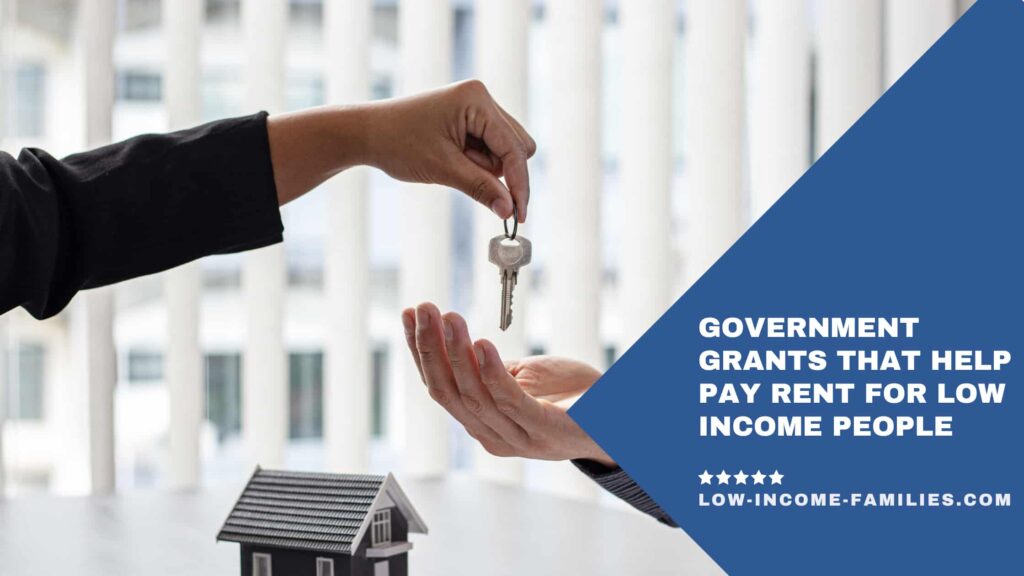In the United States, felons often face significant challenges when trying to find stable and affordable housing.
This struggle is compounded by the increasing cost of rent and the tight budgets many felons find themselves on after release.
Recognizing this issue, there are various government programs and charitable organizations dedicated to providing emergency free housing assistance to felons.
These programs, such as housing grants for felons and housing assistance for ex-felons, are designed to help felons reintegrate into society by offering them a stable living environment.
Notably, these housing grants are free, and beneficiaries are not required to repay them, making them an invaluable resource for felons looking to start anew.
Read More: Free Beds for Low Income Families
What Are The Different Sources From Which Felons Can Receive Housing Assistance?
Felons seeking housing assistance can turn to various programs and organizations for support.
These resources are designed to aid in overcoming the challenges associated with securing stable living conditions, especially when financial constraints and societal stigma are at play.
HUD Assistance Programs:
The U.S. Department of Housing and Urban Development (HUD) plays a crucial role in providing affordable housing solutions.
This federal department assists low-income individuals, including felons, by offering various housing options.
HUD’s programs often include public housing and the Housing Choice Voucher Program (Section 8), which are designed to make housing more accessible and affordable to those in need.
HUD’s initiatives are extensive, ranging from providing rental assistance to developing affordable housing projects.
Search Engines for Housing Help:
In the digital age, online platforms such as Craigslist, Zillow’s Community Pillar Program, and Zumper are invaluable for felons searching for housing.
These sites allow users to filter their searches to find “felon-friendly” housing options.
This feature simplifies the process for felons to find emergency housing or short-term financial assistance, accommodating their specific circumstances and needs.
Nonprofit Organizations:
Across America, various nonprofit organizations offer housing assistance tailored to low-income individuals, including felons.
These organizations work towards preventing homelessness and providing shelter to marginalized groups. They cater to a diverse population, including individuals with special needs and those affected by specific health conditions.
Examples include organizations like Catholic Charities and the Salvation Army, which not only provide housing assistance but also offer additional support services.
Local Churches and Religious Institutions:
Local churches and other faith-based organizations are often a bastion of support for individuals in need, including felons looking for housing assistance.
These institutions may provide direct housing support or connect individuals to community resources and programs that can help in finding suitable housing.
Government-Funded Programs:
The government funds several programs that assist in housing, with the Section 8 Housing Choice Voucher Program being one of the most well-known.
These programs are designed to offer housing at a reduced cost to eligible individuals. However, felons should be aware that eligibility for these programs can be stringent, and some criminal records may pose barriers to acceptance.
State-Specific Grants and Programs:
Tailored to address the needs of local populations, state-specific grants and programs offer targeted assistance. For example, grants for felons in Arkansas or housing programs for felons in California may provide resources and support tailored to the unique challenges faced by felons in these states.
These programs can vary significantly in terms of eligibility, the extent of assistance provided, and the application process.
Read More: Blu M8l Tablet Free Government
Eligibility Criteria And Documents Required To Receive Housing Assistance For Felons
For felons seeking housing assistance, understanding and meeting the eligibility criteria is crucial. These criteria ensure that assistance is provided to those who need it most. Here’s a detailed breakdown:
Citizenship or Legal Residency:
- Applicants must provide proof of their legal status in the United States. This could be a citizenship certificate for U.S. citizens or appropriate documentation for legal residents like green cards.
Income Verification:
- A key criterion is the applicant’s income level. Felons need to present documents like recent pay stubs (usually for the last three months), bank statements, and other financial documents to establish their income status.
- This helps in determining their eligibility based on the income guidelines of the housing program.
Valid Identification and Social Security Number:
- A government-issued ID (such as a driver’s license or state ID card) and a Social Security number are mandatory.
- These assist in identity verification and are essential for the required background checks.
Criminal Background Check:
- A comprehensive background check is conducted, focusing on the applicant’s criminal history.
- This is particularly vital for programs aimed at providing housing assistance to felons.
Proof of Residence and Rental History:
- Documenting current and previous residences is important. Applicants should provide a list of past residences, rental agreements, and utility bills to show their rental history and current living situation.
Additional Documents:
- Depending on the specific program’s requirements, additional documents may be required. This could include birth certificates, tax returns, credit reports, and evidence of any other government assistance received, like food stamps.
Read More: Ashley Furniture Free Bed Assistance Program
How To Apply For Free Emergency Housing Assistance For Felons
Applying for emergency housing assistance requires felons to navigate a structured process. Each step is crucial to ensure they meet the necessary criteria and increase their likelihood of receiving assistance.
Identify Suitable Programs:
- The first step involves researching and identifying programs that offer housing assistance specifically for felons.
- This could include federal initiatives like HUD housing programs, Section 8, or state-specific aid like housing programs for felons in California or grants for felons in Arkansas.
- It’s important to understand the unique offerings and eligibility criteria of each program, as they can vary significantly.
- Resources for identifying these programs include online search engines, local government offices, social service agencies, and legal aid organizations.
Gather Necessary Documentation:
- Preparation is key in this step. Applicants need to assemble all required documents, which typically include proof of income (like pay stubs and bank statements), legal identification (such as a state ID or driver’s license), Social Security number, proof of legal status in the U.S., and a comprehensive criminal background check.
- Additionally, having documents that show past rental history, including leases and utility bills, can be beneficial.
- This step may also require gathering character references or letters of recommendation from previous landlords, employers, or community leaders.
Contact Housing Agencies or Organizations:
- This step involves reaching out to the appropriate agencies or organizations that manage the housing assistance programs.
- Local public housing authorities (PHAs), non-profit organizations, and community housing centers can provide information on how to apply, deadlines, and any upcoming housing fairs or workshops.
- It’s advisable to set up in-person meetings or consultations to get a clearer understanding of the process and to establish a direct contact point for future communications.
Complete and Submit the Application:
- Accurately completing the application is crucial. This involves filling out forms with personal details, housing history, income information, and other relevant data.
- It’s important to answer all questions truthfully and to the best of one’s knowledge. Once completed, the application, along with all the supporting documents, should be submitted either online, by mail, or in person, as per the program’s guidelines.
- Ensuring that the application is submitted before any given deadline is also critical.
Stay Organized and Follow Up:
- After submission, applicants should maintain a well-organized file of all documents, applications, and correspondences related to their housing assistance request.
- This file should include copies of all submitted forms, reference numbers, and contact details of the housing agency.
- Regular follow-ups with the agency are essential to check on the status of the application, understand the next steps, and address any additional requirements or clarifications.
- Keeping a log of all communications can also be helpful for reference in future interactions.
Read More: Free Government Grants for Dental Implants
What Are The Available Housing Assistance For Felons?
Felons in need of housing assistance have access to a variety of programs designed to aid their reintegration into society.
One of the primary options is public housing managed by the U.S. Department of Housing and Urban Development (HUD).
These government-owned apartments and housing complexes are available throughout the country, either for free or at a substantially reduced cost.
Additionally, programs like the Section 8 Housing Choice Voucher Program play a crucial role in assisting felons.
Under Section 8, eligible felons can rent a house or apartment at a significantly discounted rate from participating landlords.
Moreover, many states have specific programs, such as housing programs for felons in California, offering tailored support based on regional needs.
Nonprofit organizations and local churches also provide valuable assistance, offering shelter and resources to those in need.
Furthermore, search engines like Craigslist and Zillow’s Community Pillar Program can be instrumental in helping felons find affordable housing options in their area.
Read More: How to Get Free Cleaning Supplies
What Are The Available Housing Grants For Felons?
Navigating the landscape of housing grants available for felons can be complex, yet these programs play an indispensable role in supporting their reintegration into society. Here’s an expanded look at some of the key housing assistance programs:
Felons HUD Rental Assistance Programs:
- Public Housing Program: This program provides affordable rental housing for low-income individuals, including felons, through properties owned by the government. The rental amount is generally determined based on a percentage of the individual’s income, ensuring affordability.
- Eligibility Concerns: While this program is a significant aid, eligibility can be influenced by the nature of the felon’s conviction. Serious offenses, particularly those involving drugs, violence, or sexual crimes, may lead to disqualification.
- Diverse Housing Options: Public housing units vary from single-family houses to high-rise apartments, catering to different family sizes and needs.
- Application Process: Felons interested in public housing need to apply through their local Public Housing Agency (PHA). This process involves submitting detailed personal and financial information and undergoing a background check.
Temporary Assistance For Needy Families Program (TANF):
- Temporary Financial Aid: TANF provides temporary financial help to low-income families. Felons can use these funds to support various needs, including housing.
- Scope and Limitations: While TANF is not exclusively for housing, the financial assistance provided can relieve some housing cost burdens. However, the amount and duration of aid vary by state, and some states may impose restrictions on felons with specific convictions.
- Aim for Self-Sufficiency: TANF’s goal extends beyond immediate financial relief, aiming to help recipients achieve long-term self-sufficiency through employment.
- Application and Eligibility: To apply for TANF, felons must contact their state’s welfare or social service agency. The application requires proof of income, family composition, and residency, among other criteria.
Section 8 Housing Choice Voucher Program:
- Flexible Housing Options: Unlike public housing, Section 8 vouchers allow participants to find their housing, such as apartments or houses, in the private market. This program offers greater autonomy in choosing where to live.
- Rent Subsidy: The program pays a subsidy directly to the landlord, and the participant pays the difference between the actual rent and the amount subsidized.
- Popularity and Waitlists: Due to its popularity, there can be long waitlists for Section 8 vouchers. Applicants often wait for months or even years before receiving assistance.
- Eligibility and Application: Eligibility is based on total annual gross income and family size. Felons must apply through their local PHA and may face restrictions based on their criminal record. The application process involves detailed financial disclosure, and applicants are usually subjected to a thorough background check.
These housing assistance programs represent vital resources for felons striving to find stable and affordable housing.
While each program has its criteria and application process, they collectively offer a range of options to address the housing needs of this population.
By leveraging these programs, felons can take significant steps towards rebuilding their lives and reintegrating into society.
Read More: Free Government Smartwatch
Are Felons Accepted Into Section 8 Housing Choice Voucher Program?
The Section 8 Housing Choice Voucher Program does accept felons, but acceptance depends on various factors, primarily the nature of their criminal history.
- Eligibility and Criminal History: While the Section 8 program is designed to be inclusive, specific criminal convictions can impact eligibility. Particularly, convictions for violent crimes, drug trafficking, or sex offenses often result in automatic disqualification. Each applicant’s background is assessed on a case-by-case basis, considering factors such as the nature of the offense, the time elapsed since the offense, and the applicant’s behavior since then.
- Background Checks: Mandatory background checks are conducted for all Section 8 applicants. These checks are thorough and are intended to safeguard community safety. The screening process may also involve checking with local law enforcement and previous landlords.
- Waiting Periods and Availability: Due to high demand, there are often lengthy waiting lists for Section 8 vouchers. This means that even eligible felons might have to wait a considerable time before they can benefit from the program.
- Application Process and Requirements: Applying for Section 8 involves submitting detailed personal, financial, and legal information to the local Public Housing Agency (PHA). This includes providing proof of income, family composition, and legal residency or citizenship. The PHA also counsels applicants on the rules of the program and their responsibilities as tenants.
Read More: Free Laptop for Veterans
What are the Pros of Halfway Houses for Felons?
Halfway houses provide several benefits for felons, aiding in their transition back into society.
- Structured Environment and Discipline: Halfway houses are known for their structured living conditions, which include curfews, mandatory participation in programs, and regular drug testing. This structured environment helps residents develop discipline and routine, essential for successful reintegration.
- Support and Rehabilitation Services: These facilities often offer various rehabilitative services, including substance abuse counseling, mental health treatment, vocational training, and educational programs. These services are crucial in addressing the underlying issues that may have contributed to criminal behavior.
- Community and Peer Support: Living among others who are in similar situations allows for a supportive community environment. Peer support in halfway houses can be a powerful motivator for change and can provide a sense of belonging and understanding.
- Gradual Reintegration into Society: Halfway houses serve as a bridge between prison and full re-entry into society. They allow residents to gradually acclimate to life outside of prison in a more controlled and supportive setting, reducing the risk of overwhelming or immediate challenges.
- Reduced Recidivism Rates: The combination of structure, support, and rehabilitation services provided in halfway houses has been shown to significantly reduce the likelihood of recidivism among felons, contributing to safer communities and better outcomes for the residents.
Read More: Free Mobility Scooter
What are the Cons of Halfway Houses for Felons?
While halfway houses are crucial in aiding the reintegration of felons into society, they come with several drawbacks that need consideration:
- Restricted Freedom and Strict Rules: Inhabitants of halfway houses are subject to strict rules and regulations, including curfews and mandatory participation in programs. This restricted freedom can be challenging for individuals who are adapting to life after incarceration. The structured environment, while beneficial for some, can feel restrictive and limit personal autonomy.
- Quality and Resource Variability: The quality of facilities and the resources available in halfway houses can vary widely. Some may not be well-maintained or may lack adequate support services such as mental health counseling, educational opportunities, or effective job training programs. This inconsistency can significantly impact the effectiveness of these facilities in aiding rehabilitation and reintegration.
- Exposure to Negative Influences: Halfway houses group together individuals at different stages of rehabilitation, and this can sometimes result in exposure to negative influences. Interaction with peers who are not fully committed to reform can pose a risk of relapse into old habits or behaviors for some residents.
- Overcrowding and Limited Privacy: Many halfway houses suffer from overcrowding due to high demand and limited availability. This can lead to cramped living conditions, limited privacy, and strained resources, which can be stressful and counterproductive to the goal of rehabilitation.
Read More: Free Medicaid Tablet
Find Shelters for Felons Online
The internet is a valuable resource for felons seeking housing or shelters, with various platforms and services available:
- Specialized Websites and Directories: There are dedicated websites and online directories that focus specifically on housing for felons. These platforms provide comprehensive lists of available shelters, including detailed information about each facility’s services, rules, and application process.
- Search Engines with Custom Filters: Platforms like Craigslist and Zillow’s Community Pillar Program are beneficial for their custom search filters. Felons can use these filters to find housing options that are specifically labeled as felon-friendly, streamlining the search process and increasing the chances of finding suitable accommodation.
- Online Resources and Support Networks: Various social service websites and online forums offer resources and support networks for felons. These sites may include links to shelter directories, advice on applying for housing assistance, and forums where individuals can share experiences and advice.
- Government and Non-Profit Organization Websites: Websites of government agencies and non-profit organizations often provide information on shelters and transitional housing programs designed for felons. These sites can also offer guidance on eligibility criteria and the application process for various housing assistance programs.
Read More: Free Refrigerator Program Cleveland Ohio
Conclusion
Navigating housing options for felons involves understanding the various resources available, from government programs like HUD and Section 8 to halfway houses and online shelter finders.
While each option has its pros and cons, they collectively provide a network of support essential for the reintegration of felons into society.
Halfway houses offer structured environments but come with limitations, while online resources ease the search for suitable housing.
Ultimately, these housing solutions play a pivotal role in offering felons a second chance, enabling them to rebuild their lives and transition smoothly back into the community.
Most Searching Posts:
- Free Government Iphone 8
- Free Android Tablet
- Free Gas Cards for Homeless
- How Can I Get a Free iPhone 7
- Free Government Iphone 12
- Free Government Iphone 13
- Free Government iPhone 14
- Free Government Phone
- Free Roofing for Seniors
- I Want Free Laptop from Google
- Car Vouchers for Single Mothers
- T-Mobile Free Tablet EBT
- Safelink Free Tablet
Frequently Asked Questions (FAQ):
What Types of Housing Assistance Programs Are Available for Felons in the Us?
Felons can seek assistance from various sources including HUD programs, nonprofit organizations, local churches, government-funded initiatives like Section 8, state-specific grants, and online platforms for housing help.
What Are the Eligibility Criteria and Required Documents for Felons to Receive Housing Assistance?
Applicants typically need to provide proof of citizenship or legal residency, income verification, valid identification and Social Security number, undergo a criminal background check, show proof of residence and rental history, and may need additional documents based on specific program requirements.
How Can Felons Apply for Free Emergency Housing Assistance?
Felons should identify suitable programs, gather necessary documentation, contact housing agencies, complete and submit applications accurately, and maintain organized communication with the agency for updates and follow-ups.
What Are Some Available Housing Assistance Programs for Felons?
Options include public housing managed by HUD, Section 8 Housing Choice Voucher Program, state-specific programs, nonprofit organizations, local churches, and online platforms like Craigslist and Zillow’s Community Pillar Program.
Are Felons Accepted into the Section 8 Housing Choice Voucher Program?
Yes, felons can apply, but acceptance depends on the nature of their criminal history. Specific convictions, especially for violent crimes, drug trafficking, or sex offenses, might impact eligibility.
What Are the Pros and Cons of Halfway Houses for Felons?
Pros include structured environments, support services, community support, gradual reintegration, and reduced recidivism. Cons involve restricted freedom, variability in quality/resources, exposure to negative influences, overcrowding, and limited privacy.
Where Can Felons Find Shelters Online?
Felons can use specialized websites and directories, custom search filters on platforms like Craigslist and Zillow, online resources, government and non-profit organization websites to find shelters and transitional housing programs.
What’s the Significance of Housing Solutions for Felons?
These housing options, though varied in their nature, collectively offer essential support for felons’ reintegration, providing second chances and opportunities to rebuild their lives and smoothly transition back into the community.




